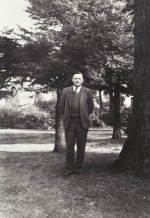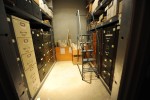Through more than three decades of the Long Term Ecological Research (LTER) program, the network and its 26 individual sites have paid attention to the management of data from ongoing research and monitoring programs. As a result each site has excellent databases and large and eclectic catalogues of empirical data that can be used for comparative analysis. We believe that parallel to these information management efforts, there should be an effort to preserve, organize and curate the historical records of the LTER programs themselves—whether for archival purposes or for practical matters of LTER science and administration. The LTER program, embodied in the collective work of individual LTER sites, is a cultural resource worthy of preservation. It would be tragic to undervalue historical records that might lie buried in a file cabinet or desk drawer or the memories of individual researchers who painstakingly built this program.It seems a good time to step back and consider our past. By preserving and maintaining historical records, sites can provide answers to questions that are important to current and future researchers, as well as to historians of science. Some of these questions include: How have trends in science unfolded over time, and how have LTER sites or the LTER program reflected or affected those trends? What has been the impact of new technologies on our scientific findings or our modes of data collection? What social forces have had impacts on LTER? How have natural disturbance processes shaped the trajectories of our thinking and LTER programs?
Several LTER sites have explored historical projects:
- at the Santa Barbara Coastal (SBC) LTER a group of researchers is writing a history of the study area, though not specifically of the LTER program;
- the co-Principal Investigator of the McMurdo Dry Valleys (MCM) LTER, a historian, is assessing data collected by early twentieth-century explorers; and
- Gina Rumore at the University of Minnesota has been working on a history of the LTER concept.
Recently the H.J. Andrews Experimental Forest LTER site (AND) began a program to inventory, catalogue, assess, and archive records of the site and associated projects, from its days as an early USDA Experimental Forest in the late 1940s to the present LTER era that began in 1980. We are uncovering records scattered across a number of places, including the U.S. Forest Service’s Pacific Northwest Research Station facilities in Corvallis, Oregon, the College of Forestry at Oregon State University (OSU), and at the AND site offices.
We have also reached out to current and former academic researchers and Forest Service personnel in efforts that have already uncovered valuable historical material and raised awareness on the value of those old files. Collaborating with us on archival management is the OSU Special Collections & Archives Research Center, which has generously agreed to house the Andrews Forest Archive. In addition, we are beginning to collect new oral histories to supplement similar interviews conducted in the 1990s. This potential archive has already attracted attention of environmental and policy historians, and we now plan to commission historical research and publication on key topics.
The theme of history record-keeping and analysis is likely to become a central feature of LTER programs at this critical juncture as the first generation of LTER researchers move on. It seems an especially appropriate theme on the occasion of the centennial of the Ecological Society of America (ESA) in 2015. Plans for a working session and symposium on history and archives to be presented during the 2015 ESA meeting in Baltimore, Maryland, are in the early stages of development.
Another possible venue for one or more sessions on the history of LTER sites is the History and Philosophy of Science section at the annual meetings of the American Association for the Advancement of Science (AAAS) (the deadline for proposal submission for the 2015 meeting in San Jose, California, is April 2014).
Moreover, possible connections can be made with arts and humanities projects, such as the Ecological Reflections program, at individual sites. Please let Anita Guerrini (anita.guerrini@oregonstate.edu) know of your or your site’s interests in these topics, as well as any feedback or ideas you might have.
There may be other projects of which we are unaware, but none of the few mentioned above is focused on the programmatic history of an LTER site or on the preservation of documents.

 Enlarge this image
Enlarge this image
